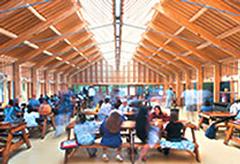Stage 2: SemifinalistsWe are happy to announce that 32 contestants out of 185 participants have advanced to the Semifinalist round (Stage Two) of the Berkeley Prize 2003 competition. This includes four two-person teams. Architecture students from 31 countries entered this year’s competition, including: Algeria, Australia, Austria, Brazil, Canada, Colombia, Egypt, France, Germany, Greece, Hong Kong, India, Indonesia, Iran, Italy, Malaysia, Malta, Mexico, Nepal, the Philippines, Portugal, Singapore, South Africa, Spain, Sweden, UK, Uruguay, USA and Yugoslavia. Semi-Finalists are invited to submit a 2500-word essay based on their 500-word proposal. The top five to seven essays will be selected for final judging by the Berkeley Prize Jury. Abo-tera, Mohamad, Higher Technological Institute, Egypt Berg, Jamie, University of Pennsylvania, USA Bustamante, Luis, University of Miami, USA Geraldez, Tracy, niversity of Texas at Austin, USA Gullberg, Johanna, KTH - The Royal Institute of Technology, Stockholm, Sweden Isacson, Johan AND Susanne Almroth, Chalmers University of Technology, Sweden Kho, Clement AND Lau Yang Zheng Justin, National University of Singapore, Singapore Lachhwani, Vikas AND Rashi Sharma, Indian Institute of Technology, Kharagpur, India Leggett, Gary, Princeton University, USA Leu, Christine, University of Waterloo, Canada Liggos, John, RWTH-Aachen, Greece Martinez, Rafael, University of California, Berkeley, USA Pundir, Shivani, Govt. College of Architecture, Lucknow, India Reynolds, Jessica, University of Cambridge, UK Skarf, Joshua, University of Michigan, USA Soleymani, Faraz AND Mohammad Nahavandi, Architecture MA, Iran Sparrow, Martha, University of Toronto, Canada Swartz, Aron, Chalmers University of Technology, Goteborg, Sweden Toledo, Eduardo, Universidade Federal de Vi, Brazil Yeung, Kenneth AND Kenneth K Yeung Elwin J. Wong, UC Berkeley, USA Ying San, Ooi, University Technology Malaysia, Malaysia INSTRUCTIONS TO SEMIFINALISTS
The essays are due at 12:00 Noon, Pacific Standard Time (20:00 hrs. Universal Time) on March 1, 2003 through the online submission system available on this page in mid February. When architects strive to create lasting monuments, some become part of the significant cultural heritage of our age. These successes seem to embody the most socially important values of a city, region, country, or even the world. Other attempts are only the reflection of the vanity of the designer or client and pass into oblivion. Worse, they become a permanent blight on the environment. As an architect, specifically, how can your work simultaneously embody the social values of one place, a particular culture, and universal human concerns?
Remember: In answering this year's Question, the Berkeley Prize Committee is particularly interested in responses that speak to the general public. If social architecture is to become the norm, rather then the exception, the PUBLIC must be persuaded of the value of design that reflects human worth. If social architecture is to be built, rather then simply discussed, the PUBLIC must be persuaded that there is added value to building buildings much different then most of the architecture being built today.
MAKE SURE TO ADDRESS THE FOLLOWING POINTS:
THOUGHTFULLY CONSIDER YOUR IDEAS BEFORE WRITING
TRY OUT YOUR IDEAS ON OTHERS BEFORE SENDING YOUR ESSAY Additional Help and InformationAre you in need of assistance? Please email info@berkeleyprize.org. |
|

